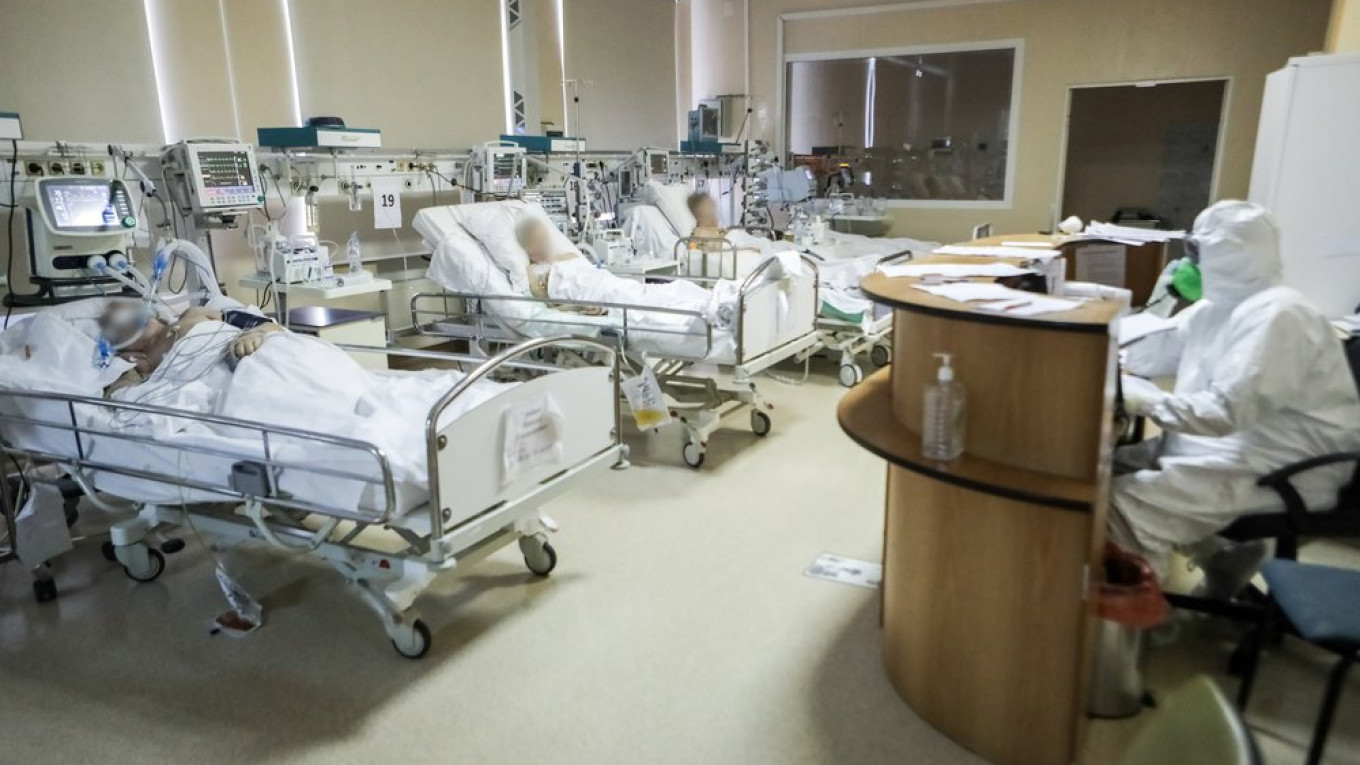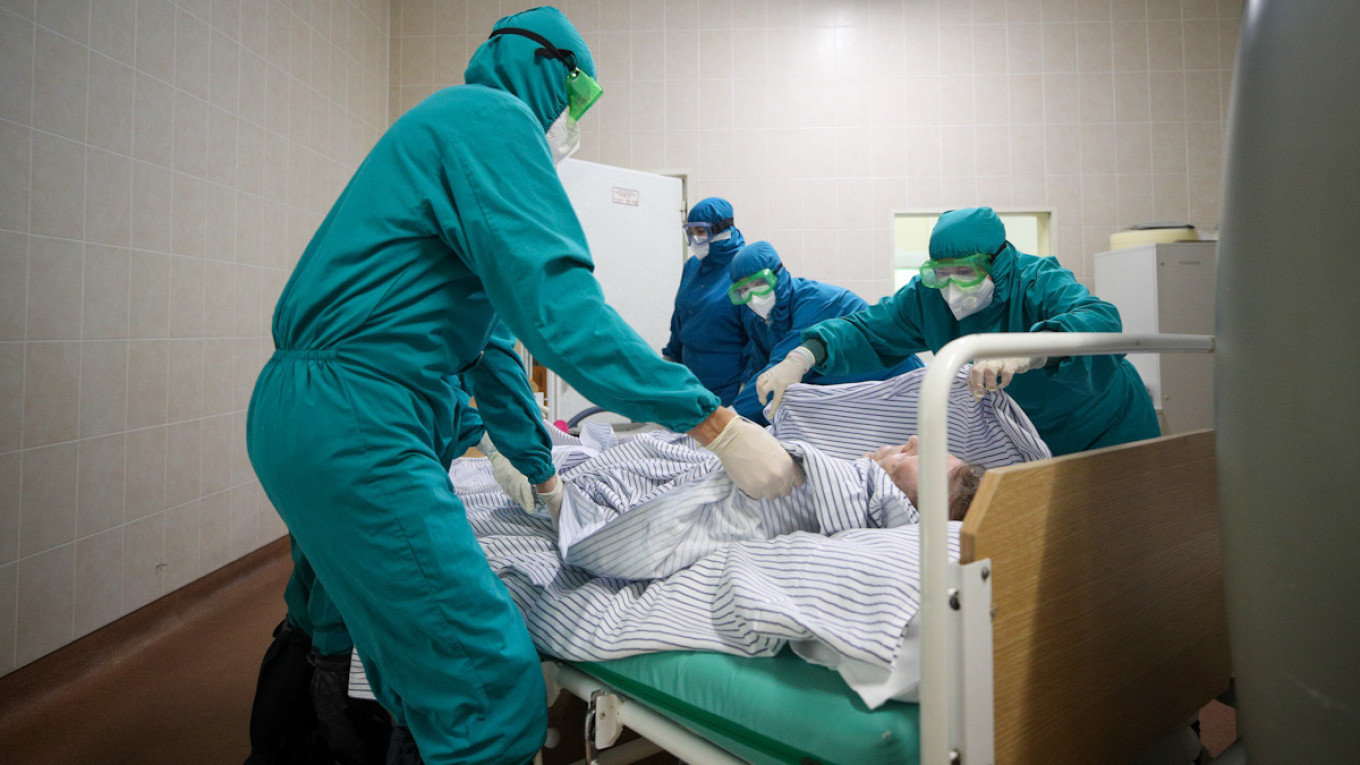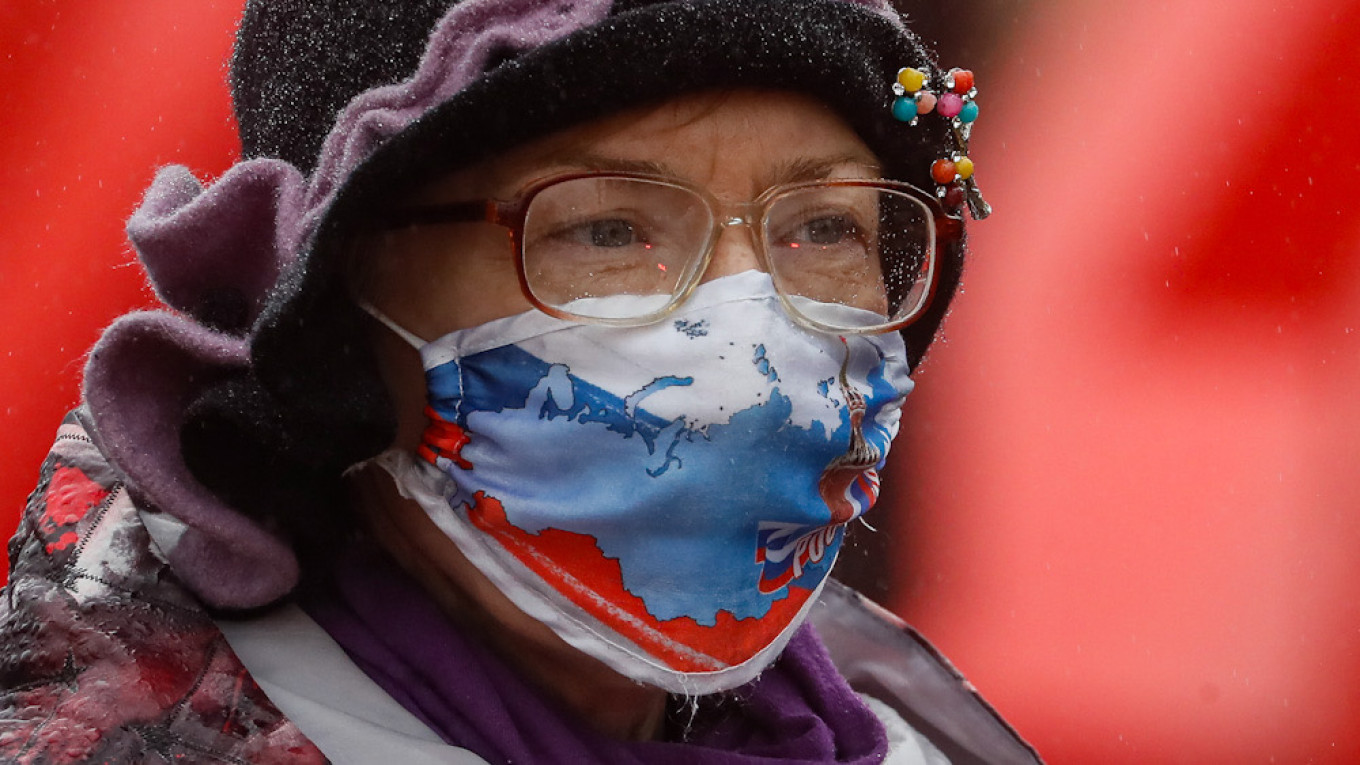As the year of the coronavirus draws to a close and Russia’s total number of cases approaches 3 million, it’s time to look back at how the world’s largest country handled the pandemic.
From the step-by-step closure of its borders at the beginning of the year to the mass roll-out of its domestically developed Sputnik V vaccine, here is a snapshot of Russia’s coronavirus timeline and The Moscow Times’ reporting on all angles of the crisis:
January
— As the coronavirus starts spreading outside China, Rospotrebnadzor head Anna Popova first hints at Russia’s plans for the development of a vaccine on Jan. 22
— Following the suspension of air traffic with the Chinese city of Wuhan on Jan. 24, Russia bans the arrival of all tour groups from China.
— On Jan. 31, Russia reports its first two coronavirus cases — one in the Tyumen region in west Siberia, and the other in Russia's Far East. The closure of the country’s Far East border with China comes into effect the same day.
February
— Russian military planes fly to Wuhan to evacuate stranded Russians on Feb 4. All arrivals are quarantined in a camp in Siberia, where some even manage to find love.
— A Russian passenger onboard the Diamond Princess cruise ship quarantined in Yokohama in Japan becomes the first Russian citizen to be diagnosed with the coronavirus, Russia’s Embassy in Japan announces on Feb. 17.
— Following the suspension of railway services and most flights to and from China, Russia bars entry for Chinese citizens starting Feb. 20 — one of the first countries to impose a blanket ban.
— Russia stops issuing visas to most Iranian and South Korea citizens from Feb. 28.
March
— Moscow confirms its first coronavirus case on March 2 and Mayor Sergei Sobyanin introduces measures to slow the spread of the disease. Body temperature checks are introduced in Moscow’s airports and Russians returning from coronavirus epicenters are ordered to self-isolate.
— Russia starts laboratory tests of the first coronavirus vaccine prototypes, the Vector Institute announces on March 16. Russia’s scientists vow to present the most promising prototypes in June.
— As the number of confirmed coronavirus cases nears 200, Russia bans entry to most foreign nationals from March 18. Russia’s coronavirus patients report online bullying, threats and intimidation amid the growing stigma.
— After Russia confirms the first coronavirus death on March 19, the government announces a "high alert" status for all 85 of its regions. With infection numbers growing, rich Russians start buying ventilators to protect themselves.

— President Vladimir Putin announces a non-working week from March 28 to April 5 in an address to the nation aired on March 25.
— Russia halts all international air traffic on March 27 and closes all border crossings from March 30. Hundreds of migrants workers are stranded in Moscow’s airports.
— After Russia’s total number of confirmed cases surpasses 1,000, Moscow enacts a citywide lockdown from March 30. Most other regions follow suit and small businesses across the country prepare for the worst.
April
— Putin announces an extension of the nationwide non-working week until April 30 in a second televised address that aired on April 2.
— Russia’s republic of Chechnya closes its borders from April 5. A messianic cult in Siberia takes the opposite approach, opening up to new followers.
— Moscow Mayor Sergei Sobyanin announces additional lockdown measures from April 13-19 and introduces a digital pass system to allow residents to leave their homes for essential reasons.
— On April 20, around 2,000 people gather in Freedom Square in the heart of Vladikavkaz to protest the self-isolation order as the North Caucasus region struggles to cope with rising infections and a worsening economic situation.
— On April 21, Moscow’s doctors report the first death among staff treating coronavirus patients in exclusive interviews with The Moscow Times.
— President Vladimir Putin announces the extension of the non-working month through May 11. Moscow's coronavirus lockdown is extended as infections rise — the capital’s paramedics and drivers tell The Moscow Times they are catching the virus en masse.
— Increased strain on Russia’s medical system prompts a government order requiring medical students to work in coronavirus hospitals. Students interviewed by The Moscow Times say they joined up under threat of academic repercussions and receive salaries that are drastically lower than promised.
May
— Moscow’s coronavirus lockdown is extended until May 31, Mayor Sergei Sobyanin announces May 7. Russia's second-largest city of St. Petersburg follows suit. Some of Russia’s LGBT youth tell The Moscow Times they are struggling with their mental health during lockdown.
— Moscow residents are required to wear face masks and gloves in all public places starting May 12.
— On May 22, the head of the state-run Gamaleya Research Center for Epidemiology and Microbiology announces that Russia has carried out its first test of a coronavirus vaccine on humans.
— As Russia prepares to emerge from a nationwide lockdown, many begin to question its low coronavirus fatality numbers but the WHO dismisses these concerns.
June
— Moscow ends its lockdown — including its digital pass system and rota for taking walks outside — on June 9. Coronavirus cases continue to rise by the thousands despite the “victory” declared by Moscow’s mayor.
— The first batch of Avifavir, the drug Russia has approved to treat coronavirus patients is delivered to some Russian hospitals on June 11. Meanwhile, Russia’s officials continue to advise usage of the controversial drug hydroxychloroquine or chloroquine for coronavirus treatment despite growing resistance from medics.
— Moscow's restaurants, gyms, swimming pools and public sports and recreation facilities reopen on June 23. With a month of summer nearly gone, Moscow’s tourism operators pray for borders to open.
— Russia holds its landmark Victory Day parade on Red Square on June 24, while several regions cancel their own Victory Day celebrations as cases rise.
— A nationwide vote on constitutional amendments vote kicks off on June 25 despite the pandemic. Russia’s health workers treating coronavirus patients say they are being pressured to vote in favor of the changes.
July
— Russia lifts self-isolation requirements for arriving foreigners from July 15.
— The Defense Ministry completes the first clinical trials of a potential coronavirus vaccine on human volunteers, a lead military scientist announces July 20. Meanwhile, reports of worsening infection levels emerge from Baikonur, the Kazakh spaceport city rented by Russia.
— On July 31, Russia’s official number of cases reaches 839,981. More than 30,000 excess deaths are recorded in July.
August
— Russia resumes direct flights with Tanzania, Turkey, and Britain on Aug. 1. Still, most couples and families separated by closed borders earlier in the year are unable to reunite.
— Russia registers the world’s first coronavirus vaccine, President Vladimir Putin announces Aug. 11.
— Russia confirmes the production of the first batch of its coronavirus vaccine on Aug. 15.
September
— Russia’s total number of coronavirus cases surpasses 1 million, making it the fourth country after the United States, Brazil and India to reach the milestone.
— Russia launches Phase 3 trials of its Sputnik V coronavirus vaccine on Sept. 9. Hopes for the vaccine are high as the economy remains ill-prepared for a second lockdown, but leading scientists remain skeptical toward it.
— Moscow confirms more than 1,000 coronavirus cases on Sept. 24 — the first time since June 23. As the second wave gathers pace, medics in hospitals across Russia voice frustration that authorities failed to use the summer respite to prepare for it.

— Moscow’s coronavirus hospitals are at capacity and the authorities move to reinstate work-from-home orders for business and mandate a new round of self-isolation for elderly residents from Sept. 28.
October
— Russia approves its second coronavirus vaccine, President Vladimir Putin announces Oct. 14.
— Moscow authorities introduce a digital registration system for bars and nightclubs from Oct. 19 but deny rumors of a return to a full lockdown.
— Russia’s national carrier Aeroflot starts training dogs to detect Covid-19 in humans.
— Russia reinstates a nationwide mask mandate from Oct. 28.
— Moscow extends its requirement for 30% of all employees to work remotely through Nov. 28.
— With 47,000 deaths reported, October becomes Russia’s deadliest month in a decade.
November
— Moscow orders all bars, restaurants, clubs and other nightlife establishments to close between 11 p.m. and 6 a.m. starting Nov. 13.
— As the situation beyond Moscow worsens, the eastern Siberian republic of Buryatia imposes a second coronavirus lockdown from Nov. 16 — the first region to do so during the second wave. The Moscow Times reports from one of Russia’s poorest cities, Ivanovo, where morgues are overflowing.
— Russia rolls out a domestic coronavirus tracing app on Nov. 24.
— Moscow orders a further extension of measures aimed at slowing the spread of the coronavirus until Jan. 15 as a shortage of hospital beds forces the authorities to convert the capital’s main speed-skating rink into a makeshift treatment center.
December
— On Dec. 2, St. Petersburg authorities order the city’s cafes, restaurants, museums, theaters and concert halls to close from Dec. 30 until Jan. 10. The move angers local business owners, who create a “Map of Resistance” showing 200 locations that will defy the orders during the holidays.
— Health Minister Mikhail Murashko presents Russia’s Sputnik V vaccine at a special session of the UN General Assembly on Dec. 2.
— Moscow starts vaccinating teachers, doctors and social workers with Sputnik V on Dec. 5 despite concerns voiced by Russia’s scientific community.
— Russia reports 29,039 new coronavirus cases on Dec. 6 — the largest one-day increase since the beginning of the pandemic.
— Mass vaccination begins across Russia’s regions during the week of Dec. 7 but Moscow-based medics interviewed by The Moscow Times express reluctance — or outright refusal — to take a vaccine that has not yet passed sufficient trials for international clinical approval.
— Russia halts all flights with Britain for one week starting Dec. 22 after a more-infectious coronavirus strain was found there.
A Message from The Moscow Times:
Dear readers,
We are facing unprecedented challenges. Russia's Prosecutor General's Office has designated The Moscow Times as an "undesirable" organization, criminalizing our work and putting our staff at risk of prosecution. This follows our earlier unjust labeling as a "foreign agent."
These actions are direct attempts to silence independent journalism in Russia. The authorities claim our work "discredits the decisions of the Russian leadership." We see things differently: we strive to provide accurate, unbiased reporting on Russia.
We, the journalists of The Moscow Times, refuse to be silenced. But to continue our work, we need your help.
Your support, no matter how small, makes a world of difference. If you can, please support us monthly starting from just $2. It's quick to set up, and every contribution makes a significant impact.
By supporting The Moscow Times, you're defending open, independent journalism in the face of repression. Thank you for standing with us.
Remind me later.







